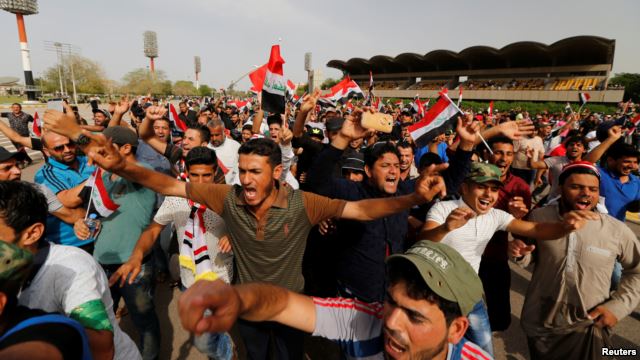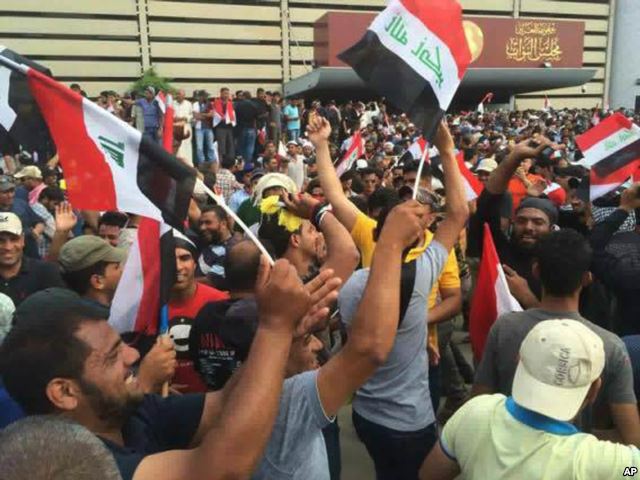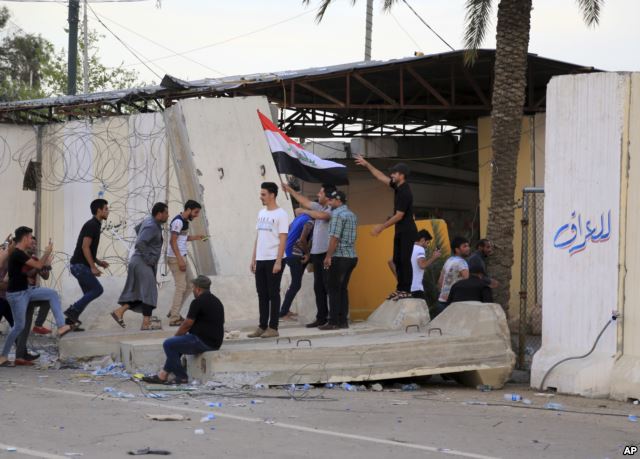Protesters Leave Iraqi Parliament Building Peacefully After Tense Standoff

Baghdad is largely back to normal after it teetered on the edge of political chaos. Anti-government protesters who had taken over the Iraqi parliament building disbanded in a mostly peaceful fashion as loud speaker announcements urged them to leave.
On Saturday, protesters led by Shi’ite cleric Moqtada al-Sadr crowded the streets in front of the country’s parliament and poured into the heavily secured Green Zone, or International Zone (IZ), which is home to the Iraqi government building and several foreign embassies.
Protesters, who had done major damage inside the parliament building during the day-long standoff, packed up their bags and carried flags with them as they left peacefully Sunday. After the protesters left, families were seen walking through the compound, swimming in a fountain and taking pictures of the well-manicured gardens.
Iraqi lawmakers flee
Lawmakers fled Saturday after protesters stormed into the parliament.

About 60 lawmakers, mostly from the minority Kurdish and Sunni parties, flew out of the capital for Irbil and Suleymania, in the northern autonomous Kurdish region.
“It was dangerous for all of us,” one parliament official told VOA, speaking on condition of anonymity out of fear of retaliation. Some lawmakers were beaten, he said.
The official said thousands of protesters were still in the so-called International Zone Sunday, parked outside the major government buildings.
Normally only those with special badges are allowed into the secured area, which is also home to many foreign embassies and the United Nations.
“It is dangerous,” the parliament official said. “At any time, the protesters could attack any embassy, any institution they want, or abuse anybody passing by.
“It seems al-Sadr wants to keep them inside the IZ so he can force the government to do what he wants,” the official said.
Political unrest
The parliament takeover was the culmination of weeks of political wrangling and increasing instability, and came just days after U.S. Vice President Joe Biden visited Baghdad.
White House Press Secretary Josh Earnest said the visit was a good indication of U.S. continued support for Iraqi Prime Minister Haider al-Abadi's efforts to unify Iraq and confront the Islamic State (IS) group.
But the visit was not enough to stave off the deepening political crisis.
Sadr has been demanding a new government of technocrats.
Abadi, who had also promised reform, had been unable to deliver any real change as political parties, unwilling to let go of their political power, blocked the majority of his list of candidates.
The prime minister on Sunday walked through the ransacked parliament building, and called on Interior Minister Mohammed Salem al-Ghabban to bring the attackers “to justice.”
Deadly violence also continued in Iraq Sunday, with Islamic State claiming responsibility for bombings that killed more than 30 people in the southern city of Samawah
Unrest growing
But even as political blocs have fought to maintain their positions and all the trappings of power, the anger in the Iraqi street has been growing for the past year over the lack of basic services, security, and the vast government corruption and political patronage.
Sadr, a firebrand cleric sometimes described as a Shi’ite nationalist, has managed to capitalize on that anger and frustration.
“Al-Sadr has the power of the people. One speech and he can deliver thousands of people to do what he wants. It is the power of the populace,” the parliament official said. “Al-Sadr is capable of running and leading the anger within each Iraqi person.”
One high-ranking Iraqi military official, also speaking to VOA on condition of anonymity, said that Sadr had many young Iraqis, including Sunnis and Christians, on his side.
The Institute for the Study of War describes Sadr’s power grab as a de facto political coup.
But the military official said Prime Minister Abadi was still in control of the Iraqi military and running the country.
Rival Shi'ite powers
Yet, the military official warned that powerful rival Shi’ite powers in Baghdad were not comfortable with Sadr’s attempted power grab. He said members of the notorious Badr Brigade militia, which is strongly allied with Iran, were beginning to converge on the capital’s center.
The possibility for intra-Shi’ite violence in Baghdad is high, and Baghdad residents said they are unsure of what will happen next.
There is also concern that IS could take advantage of the turmoil to ramp up its attacks. Iraqi security forces closed off all entrances to the city Saturday.
Resident Mahdi Makhmour, who lives outside the IZ, said the city streets were empty Sunday morning and many roads were still blocked, partly because of the start of a three-day Shi’ite religious celebration in the capital.
Политика конфиденциальности | Правила пользования сайтом











